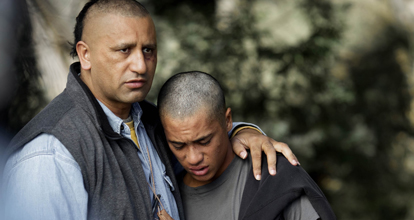
REVIEW:
You know what they say – you wait ages for a decent Kiwi film to come along, and then four arrive at once.
With a handful more debuting in the New Zealand International Film Festival (some of which we may be lucky to see on wider release later), the industry looks to be in very rude health indeed.
The key selling points of this latest local fare are the central performances by one of our greatest exports, Cliff Curtis (the man of a thousand “foreign” faces for Hollywood’s purposes), and the nation’s favourite Boy, James Rolleston.
Sure, The Dark Horse is a feel-good true story of a broken man’s redemption through the game of chess – but ultimately it’s not the narrative which will affect you as much as watching these two sensational faces portray variations on harrowing and hope.
The real “Dark Horse” was Genesis Potini, a Gisborne man challenged by bipolar disorder and frequent hospital stays, yet blessed with an uncanny knack for winning at speed chess. In 2001, film-maker Jim Marbrook (Mental Notes) made an award-winning documentary about Potini, and 13 years later his story has been dramatised for the big screen by Wellington actor-turned-director, James Napier Robertson (who also wrote the script). The Dark Horse portrays Potini being released from care into the reluctant arms of family (his brother Ariki, played with silent heft by newcomer Wayne Hapi). Potini is introduced to us as quite literally a Rainman in a technicoloured raincoat, one of many striking visual flourishes in a beautifully photographed film. Inspired to join a children’s chess club, Potini vows to take the kids to Nationals up in Auckland – however, he must keep his own life on the rails if he is to keep his promise to these tamariki. Meanwhile, Ariki’s son Mana (Rolleston) is preparing to be patched into a gang on his 15th birthday. Tensions inevitably arise when the youngster is torn between two paths. The casting alone is a coup. Uncle Bully has gone a bit soft while the Vodafone boy is tougher than you’ve ever seen him, and both Curtis and Rolleston are consistently impressive as they balance intensity with credibility, uttering vulnerable dialogue with steely eyes. The supporting cast includes familiar faces from Outrageous Fortune and many a TV movie, and the children’s club is a charming bundle of larrikins (if rendered a little more outgoing and enthusiastic for the movies than real-life experience with disadvantaged youth would suggest).
The only pitfall of a based-on-truth story is of course the necessary adherence to fact. Narratively the story is a little undercooked at times, and some of the conflicts feel trite. Thankfully, the strong, authentic performances make this an often moving piece of cinema and uphold Potini’s remarkable legacy.